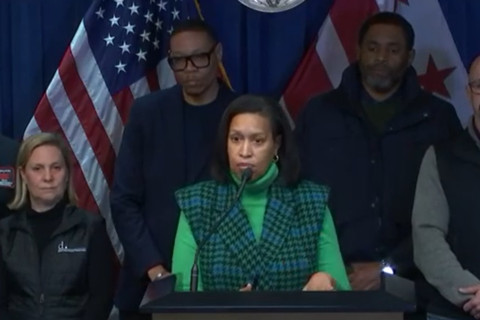The D.C. Council passed a bill Tuesday aimed at helping city restaurants rebound from the COVID-19 pandemic and deal with higher costs from inflation. It also decided to put a cap on service fees applied to customers’ bills and indicated further changes to the practice may be coming.
Dubbed the Restaurant Revitalization Act, the legislation introduces more rules for third-party delivery apps and seeks to lower liquor liability insurance costs. But much of the discussion at Tuesday’s meeting centered on service charges and the District’s tipped minimum wage initiative.
The council narrowly approved an amendment limiting service charges to no more than 20% and requiring them to be visible when a customer walks into a restaurant and on the menu.
“In effect, what we are allowing restaurants to do is to apply any service fee at any amount,” Council member Zachary Parker said. “I think in exchange for the benefit of exempting a portion of a restaurant sales by way of the service fee from their rent calculation, a cap on service fees is fair.”
Voting against it, Council member Christina Henderson noted many customers may not realize the charge isn’t the same as a tip.
“I think 20% is high. But if we’re going to do it, I feel like everybody needs to understand that the vast majority of people are not going to tip on top of 20%,” Henderson said. “Everybody needs to be comfortable that we’re essentially going to be phasing out tips if we do this.”
Several members said the council should revisit the issue again in future legislation to regulate how restaurants can use the money gained from service fees.
Meanwhile, the tipped minimum wage in D.C. is gradually increasing each year until 2027, when it will match the District’s non-tipped minimum. Known as Initiative 82, the measure was approved by voters in 2022. In a 10-3 vote Tuesday, the council shot down an amendment that would have sped up that timeline to next year.
“People didn’t just vote on to give tip workers the full minimum wage, they also voted on a very clear timeline for the change to be implemented,” Council member Janeese Lewis George said. “Moving up this timeline contradicts with [what] the majority of D.C. voters approved through Initiative 82.”
Council chairman Phil Mendelson said the Restaurant Association Metropolitan Washington supported the faster timeline, arguing it was easier for restaurants to make a one-time change rather than having to adjust each year.
A statement from the restaurant association about the ‘Restaurant Revitalization’ act doesn’t mention the council’s voted against speeding up the timeline on increasing tipped workers’ wages. Instead, it celebrated the passage of other amendments, including the cap on service charges — which the association said will protect restaurants from “frivolous lawsuits” by clarifying how such fees can be used.
“There is much more work to do in our industry, but the passage of this act promises substantial benefits for our neighborhood restaurants, including operators, workers, and diners alike,” said Shawn Townsend, president and CEO of the restaurant association, in a news release.
The bill now heads to Mayor Muriel Bowser’s desk.
Get breaking news and daily headlines delivered to your email inbox by signing up here.
© 2024 WTOP. All Rights Reserved. This website is not intended for users located within the European Economic Area.







